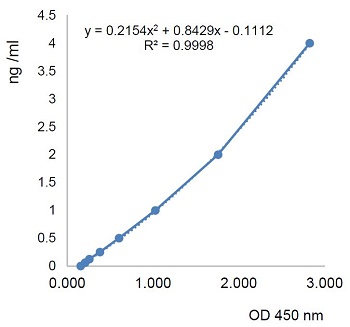Adiponectin (rat) ELISA Kit
Product Code:
AG-45B-0026
AG-45B-0026
Regulatory Status:
RUO
RUO
Target Species:
- Human
- Mouse
- Rat
Shipping:
BLUE ICE
BLUE ICE
Storage:
Short Term Storage: +4?C. Long Term Storage: +4?C
Short Term Storage: +4?C. Long Term Storage: +4?C
No additional charges, what you see is what you pay! *
| Code | Size | Price |
|---|
| AG-45B-0026-KI01 | 96 wells | £430.00 |
Quantity:
Prices exclude any Taxes / VAT
Stay in control of your spending. These prices have no additional charges, not even shipping!
* Rare exceptions are clearly labelled (only 0.14% of items!).
* Rare exceptions are clearly labelled (only 0.14% of items!).
Multibuy discounts available! Contact us to find what you can save.
This product comes from: Switzerland.
Typical lead time: 7-10 working days.
Contact us for more accurate information.
Typical lead time: 7-10 working days.
Contact us for more accurate information.
- Further Information
- Documents
- Show All
Further Information
Alternate Names/Synonyms:
ACRP30; AdipoQ; apM1; GBP28; Adipocyte Complement Related Protein of 30kDa
Assay Type:
Sandwich
Detection Type:
Colorimetric
EClass:
32160000
Form (Short):
solid
Handling Advice:
After standard reconstitution, prepare aliquots and store at -20°C. Avoid freeze/thaw cycles. Plate and reagents should reach room temperature before use.
Long Description:
ELISA Assay. Detects rat adiponectin. Does cross-react with mouse adiponectin or human adiponectin. Assay Type: Sandwich. Detection Type: Colorimetric. Sample Type: Cell Culture Supernatant, Plasma, Serum. Range: 0.0625 to 4ng/ml. Sensitivity: 50pg/ml. Adiponectin [ACRP30; AdipoQ] is a promising biomarker of insulin resistance and type 2 diabetes mellitus (T2DM) but also as a potential target for management of the metabolic syndrome. It is a very robust marker that is not prone to degradation or acute inflammatory challenges, is present in relatively high concentrations in the peripheral circulation, and can be collected by a variety of methods. The benefits of using adiponectin assays in clinical settings include, (a) prediction of risk of diabetes and metabolic status and (b) providing a tool to monitor metabolic improvements. Adiponectin exerts anti-atherogenic and anti-inflammatory properties and may be important as a biomarker for obesity-related cardiovascular disease (CVD). New findings showed urinary adiponectin excretion as an independent new biomarker of microvascular and macrovascular damage in T2DM and suggested it as a very promising tool for early cardiovascular disease risk assessment. Adiponectin serum level was also described as a good biomarker of colorectal adenoma, this being related to the positive correlation between obesity and increased risk of cancer at various sites (colorectal, breast, prostate and endometrium).
NCBI, Uniprot Number:
Q8K3R4
Package Type:
Box
Product Description:
Adiponectin [ACRP30; AdipoQ] is a promising biomarker of insulin resistance and type 2 diabetes mellitus (T2DM) but also as a potential target for management of the metabolic syndrome. It is a very robust marker that is not prone to degradation or acute inflammatory challenges, is present in relatively high concentrations in the peripheral circulation, and can be collected by a variety of methods. The benefits of using adiponectin assays in clinical settings include, (a) prediction of risk of diabetes and metabolic status and (b) providing a tool to monitor metabolic improvements. Adiponectin exerts anti-atherogenic and anti-inflammatory properties and may be important as a biomarker for obesity-related cardiovascular disease (CVD). New findings showed urinary adiponectin excretion as an independent new biomarker of microvascular and macrovascular damage in T2DM and suggested it as a very promising tool for early cardiovascular disease risk assessment. Adiponectin serum level was also described as a good biomarker of colorectal adenoma, this being related to the positive correlation between obesity and increased risk of cancer at various sites (colorectal, breast, prostate and endometrium).
Range:
0.0625 to 4ng/ml
Sample Type:
Cell Culture Supernatant, Plasma, Serum
Sensitivity:
50pg/ml
Specificity:
Detects rat adiponectin. Does cross-react with mouse adiponectin or human adiponectin.
Transportation:
Non-hazardous
UNSPSC Category:
ELISA Kits
UNSPSC Number:
41116126
Use & Stability:
12 months after the day of manufacturing. See expiry date on ELISA Kit box.



